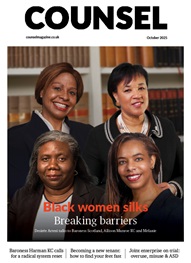*/
THE Bar Council and the Criminal Bar Association (CBA) have welcomed the final approval by Parliament of many of the changes for which they had been calling to the Coroners and Justice Bill which received Royal Assent on 12 November 2009.
The Bar Council and the CBA were concerned about a number of features of the Bill, particularly those relating to the reform of the coroner’s system, on which they had made representations to the Government and Parliament over the past year. The Government has recognised that legal aid should be available for bereaved families and other interested parties where the state is represented and that the size of coroners’ juries should not be reduced. Potentially farreaching proposals for data sharing were dropped by the Government in response to widespread concern, including from the Bar. The Bar Council is pleased that the use of Damages Based Agreements has been restricted to regulation of damages-based agreements in respect of employment claims which may go to an employment tribunal. This will allow the Government and others to take into account the conclusions of the review of the costs of civil litigation which is being conducted by Lord Justice Jackson, to which the Bar has contributed.
Commenting on the enactment of the Coroners and Justice Act, Chairman of the Bar Desmond Browne QC said:
“We are pleased that the Government recognised the force of many of the Bar’s concerns about changes to the coroners’ system, data sharing and Damages Based Agreements, prompting amendments to the Bill which Parliament approved. In these respects the Bill has been strengthened, in the public interest.”
Commenting on the enactment of the Coroners and Justice Act, Chairman of the Bar Desmond Browne QC said:
“We are pleased that the Government recognised the force of many of the Bar’s concerns about changes to the coroners’ system, data sharing and Damages Based Agreements, prompting amendments to the Bill which Parliament approved. In these respects the Bill has been strengthened, in the public interest.”
THE Bar Council and the Criminal Bar Association (CBA) have welcomed the final approval by Parliament of many of the changes for which they had been calling to the Coroners and Justice Bill which received Royal Assent on 12 November 2009.
The Bar Council and the CBA were concerned about a number of features of the Bill, particularly those relating to the reform of the coroner’s system, on which they had made representations to the Government and Parliament over the past year. The Government has recognised that legal aid should be available for bereaved families and other interested parties where the state is represented and that the size of coroners’ juries should not be reduced. Potentially farreaching proposals for data sharing were dropped by the Government in response to widespread concern, including from the Bar. The Bar Council is pleased that the use of Damages Based Agreements has been restricted to regulation of damages-based agreements in respect of employment claims which may go to an employment tribunal. This will allow the Government and others to take into account the conclusions of the review of the costs of civil litigation which is being conducted by Lord Justice Jackson, to which the Bar has contributed.


Justice system requires urgent attention and next steps on the Harman Review
Q&A with Tim Lynch of Jordan Lynch Private Finance
By Marie Law, Director of Toxicology at AlphaBiolabs
By Louise Crush of Westgate Wealth Management
Why Virtual Assistants Can Meet the Legal Profession’s Exacting Standards
Despite increased awareness, why are AI hallucinations continuing to infiltrate court cases at an alarming rate? Matthew Lee investigates
Many disabled barristers face entrenched obstacles to KC appointment – both procedural and systemic, writes Diego F Soto-Miranda
The proscribing of Palestine Action under the Terrorism Act is an assault on the English language and on civil liberties, argues Paul Harris SC, founder of the Bar Human Rights Committee
For over three decades, the Bar Mock Trial Competition has boosted the skills, knowledge and confidence of tens of thousands of state school students – as sixth-form teacher Conor Duffy and Young Citizens’ Akasa Pradhan report
Suzie Miller’s latest play puts the legal system centre stage once more. Will it galvanise change? asks Rehna Azim